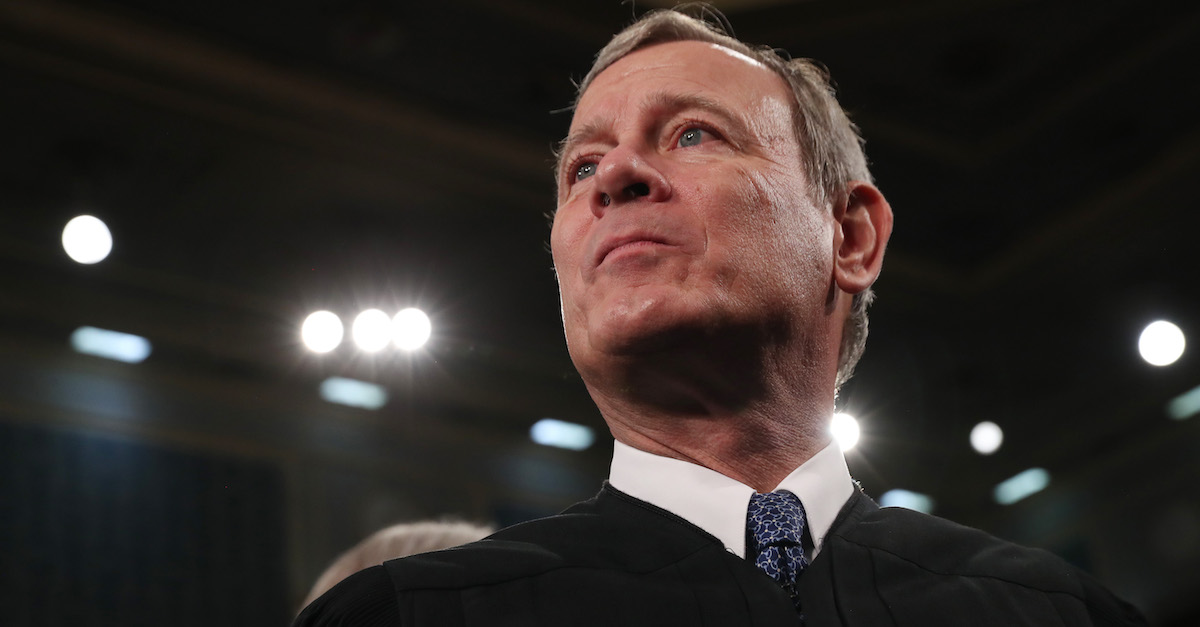
U.S. Supreme Court Chief Justice John Roberts
Chief Justice of the Supreme Court John Roberts issued an emergency stay Monday evening in a battle over a Trump-era immigration policy that has evolved into a pair of contests: one between asylum-seekers and the Centers for Disease Control and Prevention, the other between two federal judges — one a Bill Clinton appointee, and the other, a Donald Trump appointee.
At the center of the dispute lays Title 42 of the Public Health Services Act, which allows the Centers for Disease Control and Prevention (CDC) to stop individuals from entering the United States as a method of protecting the public from contagious diseases. Starting in March 2020 as the pandemic began, the Trump administration used Title 42 as the legal basis to stop migrants at the U.S.-Mexico and U.S.-Canada borders. The harsh policy, which expelled asylum-seekers without further proceedings, was harshly criticized by immigration advocates as being “inhumane” and causing danger to those most in need of safe haven.
In April 2021, the Biden administration announced that it would discontinue the policy, reasoning that it was no longer necessary for the protection of public health. However, a group of Republican state attorneys general sued, and Trump-appointed U.S. District Judge Robert Summerhays in Louisiana issued a nationwide injunction in May 2021, thereby ordering the Biden administration to continue the policy.
In an entirely separate lawsuit, a group of asylum-seeking families sued the Department of Homeland Security Secretary Alejandro Mayorkas and other government officials in the District of Columbia to challenge the controversial policy.
In the D.C. case, U.S. District Judge Emmet Sullivan (the Clinton appointee who made headlines for his role in the Michael Flynn prosecution) sided with the plaintiff families and called it “unreasonable” for the federal government to deny non-citizens safe harbor on the grounds of protecting public health. Sullivan issued a lengthy memorandum opinion, in which he said that the CDC may have had a valid interest in preventing the spread of COVID-19, but that the government did not choose the “least restrictive means” to accomplish its goals and unjustifiably employed its strict policy in an “arbitrary and capricious” manner. Sullivan ordered the Biden administration to end the policy by December 21, 2022.
After Sullivan’s ruling, the state-plaintiffs in the Louisiana case requested to intervene in the D.C. case (which was already in the appeals process), and argued that Sullivan’s ruling to end the policy would neutralize Summerhays’ order to continue it.
The D.C. Circuit refused to allow the states to intervene as parties on the basis that their request came far too late. A three-judge panel of the appeals court issued an unsigned order that explained that the litigation had already been pending for two years, and that the states only asked to intervene once an appeal was underway. The panel reasoned that the states should have been aware of their own interest in the litigation (particularly since the Biden administration announced the policy’s end months ago), and should have asked to intervene earlier. The states were, however, permitted to file briefs as amicus curiae in the case.
The panel consisted of U.S. Circuit judges Patricia Millett, a Barack Obama appointee; Justin Walker, a Donald Trump appointee; and Florence Pan, a Joe Biden appointee.
The would-be state plaintiffs next asked that SCOTUS stay Sullivan’s order and keep the Title 42 policy in place.
In a brief, 7-line order, the chief justice granted an “administrative” stay and ordered the Biden administration to submit a response by Tuesday at 5 p.m. Eastern Time. The nature of the ruling indicates that the freezing of Sullivan’s order was directed in order to allow the justices to consider the underlying appeal. As an “administrative” ruling, it has no fixed expiration date and will continue in effect until the justices rule otherwise.
Roberts’ order in the litigation over Title 42 comes less than a month after the chief justice presided over oral arguments in another case challenging Biden’s immigration policies. In late November, the Biden administration argued that it should be permitted to prioritize the deportation of certain groups immigrants as it sees fit, and warned the justices against a ruling that would threaten national security by crippling the administration’s efforts to focus on dangerous immigrants. The justices have yet to rule in that case.
Since President Biden took office in January 2021, the Supreme Court also ruled unanimously to deny green cards to some immigrants, but ruled 5-4 that the Biden administration has the authority to end the Trump-era “Remain in Mexico” policy.
[image via Reuters/Leah Millis/Pool]